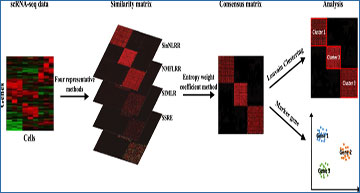In recent years, single-cell RNA sequencing (scRNA-seq) technology has revolutionized our understanding of cellular composition and diversity. With the wealth of scRNA-seq data available, scientists have a unique opportunity to explore the intricate world of individual cells like never before. However, with numerous computational algorithms developed for predicting cell types, navigating through the plethora of methods can be daunting.
To shed light on this complex landscape, a team of researchers at Jiaotong University embarked on a comprehensive review of 20 state-of-the-art unsupervised cell type identification methods. Their goal? To provide a standardized evaluation of these methods using real scRNA-seq datasets, allowing for a clear comparison of their strengths and weaknesses.
After meticulous evaluation, the researchers also introduced a novel ensemble cell-type identification method called scEM. This innovative approach combines the strengths of four representative methods, leveraging the power of consensus to predict cellular type composition accurately. By applying the entropy weight method, scEM learns from diverse perspectives to create a consensus similarity matrix. The final classification of individual cells is then determined using the Louvain algorithm.
But does scEM live up to its promise? Extensive evaluation and comparison with 11 other similarity-based methods across a range of scRNA-seq datasets provide a resounding answer: yes. The newly developed ensemble algorithm proves its effectiveness in predicting cellular type composition with impressive accuracy.
This groundbreaking research not only enhances our understanding of single-cell diversity but also paves the way for more robust and reliable analysis in the field of scRNA-seq. By providing a standardized framework for evaluating cell type identification methods, scientists can now navigate through the complexity of scRNA-seq data with confidence.
Cai X, Zhang W, Zheng X, Xu Y, Li Y. (2024) scEM: A New Ensemble Framework for Predicting Cell Type Composition Based on scRNA-Seq Data. Interdiscip Sci [Epub ahead of print]. [absract]





